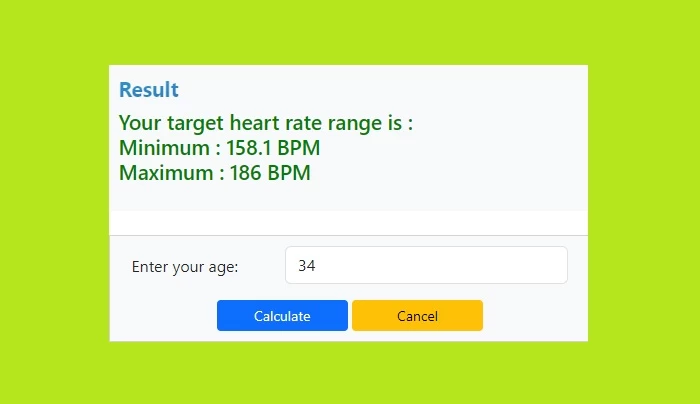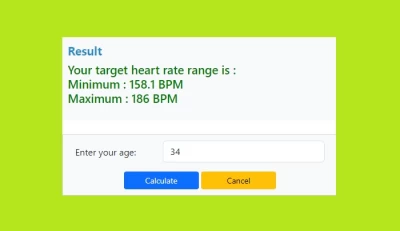Heart Rate Insights: Monitoring Cardiovascular Well-Being with Precision
Learn about the significance of heart rate, explore the mechanics behind a heart rate calculator, and understand why regularly checking your heart rate is vital for overall well-being.

Introduction:
The heart is a remarkable organ that pumps blood throughout our bodies, ensuring the delivery of oxygen and nutrients to every cell. Understanding how our heart functions is crucial for maintaining good health. One key aspect to monitor is our heart rate, a simple yet powerful indicator of our cardiovascular well-being.
What is Heart Rate?
Heart rate, often expressed as beats per minute (BPM), refers to the number of times the heart contracts in a minute. It's a dynamic measure that various factors, including physical activity, stress, and overall health, can influence. An average resting heart rate for adults typically ranges between 60 to 100 BPM.
Heart Rate Calculator:
A heart rate calculator determines your heart rate based on your age by using a simple formula. This formula takes into account the general relationship between age and the average heart rate at rest. In easy terms, as you age, your heart rate at rest tends to change. The calculation involves subtracting your age from a predetermined maximum heart rate value.
The typical formula is derived from the idea that the maximum heart rate declines with age. It is often estimated using the equation: Maximum Heart Rate = 220 - Your Age. This means that, according to this formula, your estimated maximum heart rate decreases as you get older. Once the maximum heart rate is determined, the heart rate calculator can then calculate your target heart rate zones for different levels of exercise intensity. These zones help guide your workouts to ensure you're exercising at an intensity that aligns with your fitness goals.
It's important to note that while this formula provides a general estimate, individual variations exist, and other factors such as fitness level, genetics, and health conditions can influence your actual heart rate. Therefore, it's always advisable to consult with a healthcare professional or fitness expert for personalized advice on heart rate and exercise.

Why is it Important to Keep Checking Your Heart Rate Regularly?
Checking your heart rate regularly is essential because it helps you keep track of how well your heart is working. Your heart rate is the number of times your heart beats in a minute, and it can tell you important things about your health.
- Heart Health Monitoring: Your heart is like a hardworking pump that circulates blood throughout your body. By checking your heart rate regularly, you can monitor its efficiency. If your heart rate is too fast or too slow, it may indicate an issue with your heart health.
- Exercise and Fitness: When you exercise, your heart rate naturally goes up to supply your muscles with more oxygen. Monitoring your heart rate during exercise can help you ensure that you are working out at a safe and effective intensity. It also allows you to adjust your exercise routine to meet your fitness goals.
- Stress and Relaxation: Stress can affect your heart rate, making it go up. Regularly checking your heart rate can provide insights into how stress is impacting your body. Techniques like deep breathing or meditation can help lower your heart rate, promoting relaxation.
- Medication Effects: Some medications can influence your heart rate. By monitoring it regularly, you and your healthcare provider can assess whether your medications are working as intended or if adjustments are needed.
- Detecting Abnormalities Early: Changes in your heart rate can sometimes be a sign of underlying health issues, such as arrhythmias or other cardiovascular conditions. Regular monitoring can help detect abnormalities early, allowing for timely medical intervention and better management of potential problems.

Introduction:
The heart is a remarkable organ that pumps blood throughout our bodies, ensuring the delivery of oxygen and nutrients to every cell. Understanding how our heart functions is crucial for maintaining good health. One key aspect to monitor is our heart rate, a simple yet powerful indicator of our cardiovascular well-being.
What is Heart Rate?
Heart rate, often expressed as beats per minute (BPM), refers to the number of times the heart contracts in a minute. It's a dynamic measure that various factors, including physical activity, stress, and overall health, can influence. An average resting heart rate for adults typically ranges between 60 to 100 BPM.
Heart Rate Calculator:
A heart rate calculator determines your heart rate based on your age by using a simple formula. This formula takes into account the general relationship between age and the average heart rate at rest. In easy terms, as you age, your heart rate at rest tends to change. The calculation involves subtracting your age from a predetermined maximum heart rate value.
The typical formula is derived from the idea that the maximum heart rate declines with age. It is often estimated using the equation: Maximum Heart Rate = 220 - Your Age. This means that, according to this formula, your estimated maximum heart rate decreases as you get older. Once the maximum heart rate is determined, the heart rate calculator can then calculate your target heart rate zones for different levels of exercise intensity. These zones help guide your workouts to ensure you're exercising at an intensity that aligns with your fitness goals.
It's important to note that while this formula provides a general estimate, individual variations exist, and other factors such as fitness level, genetics, and health conditions can influence your actual heart rate. Therefore, it's always advisable to consult with a healthcare professional or fitness expert for personalized advice on heart rate and exercise.

Why is it Important to Keep Checking Your Heart Rate Regularly?
Checking your heart rate regularly is essential because it helps you keep track of how well your heart is working. Your heart rate is the number of times your heart beats in a minute, and it can tell you important things about your health.
- Heart Health Monitoring: Your heart is like a hardworking pump that circulates blood throughout your body. By checking your heart rate regularly, you can monitor its efficiency. If your heart rate is too fast or too slow, it may indicate an issue with your heart health.
- Exercise and Fitness: When you exercise, your heart rate naturally goes up to supply your muscles with more oxygen. Monitoring your heart rate during exercise can help you ensure that you are working out at a safe and effective intensity. It also allows you to adjust your exercise routine to meet your fitness goals.
- Stress and Relaxation: Stress can affect your heart rate, making it go up. Regularly checking your heart rate can provide insights into how stress is impacting your body. Techniques like deep breathing or meditation can help lower your heart rate, promoting relaxation.
- Medication Effects: Some medications can influence your heart rate. By monitoring it regularly, you and your healthcare provider can assess whether your medications are working as intended or if adjustments are needed.
- Detecting Abnormalities Early: Changes in your heart rate can sometimes be a sign of underlying health issues, such as arrhythmias or other cardiovascular conditions. Regular monitoring can help detect abnormalities early, allowing for timely medical intervention and better management of potential problems.
Conversation
Latest Blogs
© Blog CoolCalculator, Explore CoolCalculator, your destination for the latest insights, tips, and updates on the world of online calculators. Stay informed and make your calculations smarter with our blog. ,
Designed
by Saad Media Team , Team Lead M.Rizwan Akhtar












